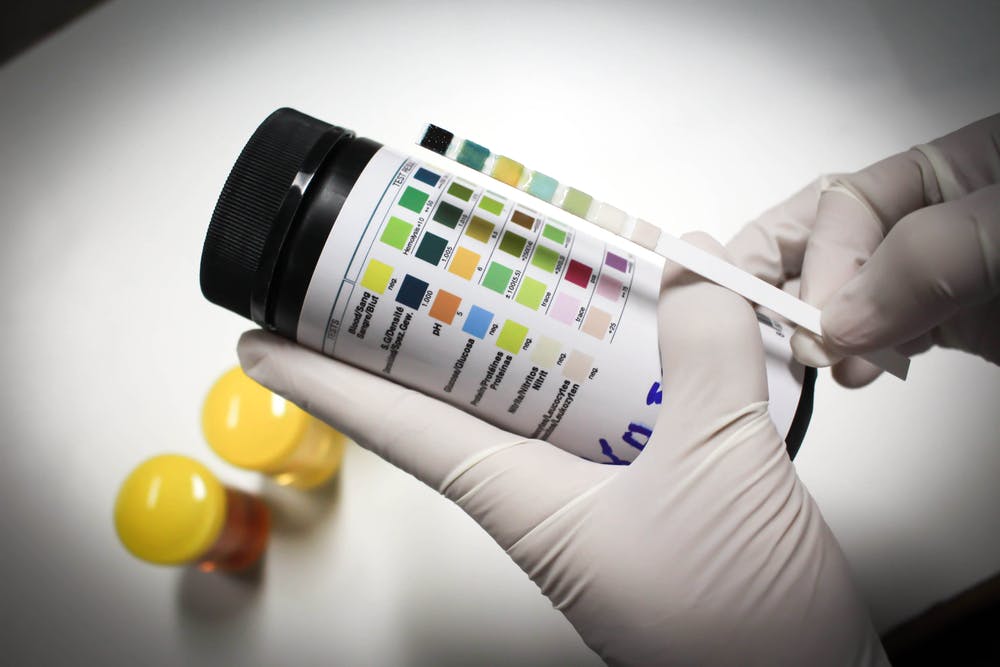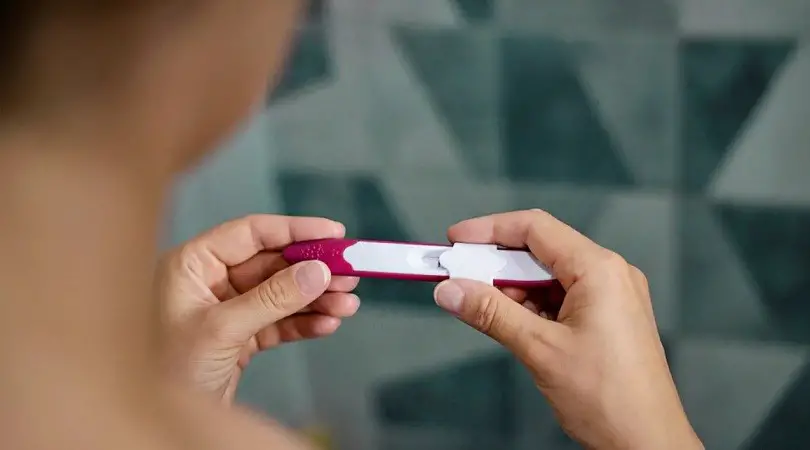Last Updated on January 6, 2025
No, a uti test cannot detect pregnancy. However, there are specific tests designed to detect pregnancy accurately and early on.
Detecting pregnancy is an important aspect of women’s health. While urinary tract infections (utis) and pregnancy share some symptoms, a uti test is not capable of detecting pregnancy. Instead, specialized tests are available to accurately determine whether an individual is pregnant or not.
These tests work by detecting the presence of specific hormones in the body that are produced during pregnancy. By understanding the differences between a uti test and pregnancy tests, individuals can ensure they receive the appropriate test for their specific needs and concerns. This article will explore the reasons why a uti test cannot detect pregnancy and introduce the alternative methods available for accurate pregnancy detection.

Credit: theconversation.com
Understanding The Relationship Between Utis And Pregnancy
Pregnancy is undoubtedly an exciting time for many women, but it also brings about certain changes in the body that can increase the risk of developing urinary tract infections (utis). In this section, we will explore the connection between utis and pregnancy, highlighting the impact of hormonal changes, the risk factors involved, and the importance of early detection and treatment for both utis and pregnancy.
How Utis And Pregnancy Are Related
- Urinary tract infections occur when bacteria enter the urinary system and multiply, leading to uncomfortable symptoms like frequent urination, burning sensation, and pain.
- During pregnancy, hormonal changes cause the muscles and tissues in the urinary system to relax, which can slow down the flow of urine and make it easier for bacteria to grow.
- Additionally, as the uterus expands, it can put pressure on the bladder, further compromising the complete emptying of urine and increasing the risk of utis.
Impact Of Hormonal Changes During Pregnancy On Uti Risk
- Hormonal changes, such as increased progesterone levels, can cause the muscles and tissues in the urinary system to relax.
- This relaxation can reduce the bladder’s ability to fully empty, making it easier for bacteria to accumulate and cause an infection.
- High levels of estrogen during pregnancy can also change the ph of the vagina, making it a more conducive environment for bacterial growth.
Risk Factors For Utis During Pregnancy
- Pregnant women are more susceptible to utis due to the anatomical and physiological changes in their bodies.
- Other risk factors include a history of utis, previous kidney infections, and urinary tract abnormalities.
- Poor personal hygiene, wearing tight-fitting clothing, and using irritating products in the genital area can further increase the risk of utis during pregnancy.
Importance Of Early Detection And Treatment For Both Utis And Pregnancy
- Prompt detection and treatment of utis during pregnancy are essential to prevent complications that can harm both the mother and the developing baby.
- Untreated utis can lead to kidney infections, premature birth, low birth weight, and other complications.
- Regular prenatal check-ups, including urine tests, help identify urinary tract infections early, allowing for timely treatment with safe antibiotics.
Understanding the relationship between utis and pregnancy is crucial for expectant mothers to take the necessary steps in preventing and managing these infections. By being aware of the hormonal changes, risk factors, and the importance of early detection and treatment, women can ensure a healthy and comfortable pregnancy journey for themselves and their babies.
The Science Behind Uti Tests And Pregnancy Detection
Uti tests are commonly used to detect urinary tract infections, but can they also detect pregnancy? Many women may wonder if they can rely on a uti test to determine if they’re expecting a baby. In this section, we will explore the science behind uti tests and their potential in detecting pregnancy.
Overview Of Different Types Of Uti Tests Available
- Urine culture test: This test involves collecting a urine sample and culturing it in a lab to identify specific bacteria that may indicate a urinary tract infection.
- Dipstick test: A dipstick is dipped into a urine sample, and the color changes are observed to determine the presence of certain substances, such as nitrites or leukocytes, which might indicate an infection.
- Rapid diagnostic tests: These tests use antibodies to detect specific proteins or microorganisms associated with urinary tract infections.
Sensitivity And Accuracy Of Uti Tests In Detecting Pregnancy
- Uti tests are primarily designed to identify and diagnose urinary tract infections. They are not specifically intended to detect pregnancy hormones.
- While some uti tests may indirectly detect certain pregnancy hormones, they are not as accurate or sensitive as specialized pregnancy tests.
- The sensitivity and accuracy of uti tests in detecting pregnancy can vary significantly, and false negatives or positives are possible.
- To confirm pregnancy, it is recommended to use a dedicated pregnancy test that is specifically designed to detect pregnancy hormones reliably.
How Uti Tests Detect Pregnancy Hormones
- Some uti tests may indirectly detect pregnancy hormones like human chorionic gonadotropin (hcg) due to the presence of antibodies or reagents that cross-react with hcg.
- However, these cross-reactive substances may be less specific and can potentially result in false-positive or false-negative results.
- It’s important to note that relying solely on a uti test for detecting pregnancy is not recommended, as specialized pregnancy tests provide more accurate results.
Common Misconceptions About Using Uti Tests For Pregnancy Detection
- Uti tests are not designed or approved for pregnancy detection; their main purpose is to diagnose urinary tract infections.
- Misinterpreting the results of a uti test as a definitive pregnancy confirmation can lead to misunderstandings and unnecessary stress.
- It’s vital to use dedicated pregnancy tests for accurate and reliable results. These tests are specifically designed to detect pregnancy hormones and have higher sensitivity and accuracy rates.
While uti tests may indirectly detect pregnancy hormones, they are not as sensitive or accurate as specialized pregnancy tests. To confirm pregnancy, it is always recommended to use a pregnancy test specifically designed for this purpose.
Frequently Asked Questions For Can A Uti Test Detect Pregnancy?
Can A Uti Test Detect Pregnancy?
No, a uti test is specifically designed to detect urinary tract infections, not pregnancy.
How Can I Detect If I’M Pregnant?
To confirm pregnancy, you can take a home pregnancy test or visit a healthcare professional for a blood test.
What Are The Symptoms Of Pregnancy?
Common symptoms of pregnancy include missed periods, nausea, breast tenderness, fatigue, and frequent urination.
Can A Uti Cause False Positive Pregnancy Test Results?
No, a uti cannot cause a false positive pregnancy test result. Only the presence of hcg hormone indicates pregnancy.
Where Can I Get A Pregnancy Test?
You can purchase a pregnancy test at most pharmacies and supermarkets, or consult your healthcare provider for a test.
Conclusion
To sum up, while a uti test is not designed to detect pregnancy, it can indirectly indicate a potential pregnancy by identifying certain underlying symptoms. The presence of bacteria or white blood cells in the urine sample can be an indication of a uti, but it can also point towards a urinary tract infection often associated with pregnancy.
However, it is important to note that a uti test cannot accurately determine pregnancy as it does not directly measure the levels of human chorionic gonadotropin (hcg) – the hormone responsible for confirming pregnancy. For a more definitive result, it is advisable to use a pregnancy test kit or consult a healthcare professional.
Stay informed, listen to your body, and always seek medical advice for accurate pregnancy detection.











